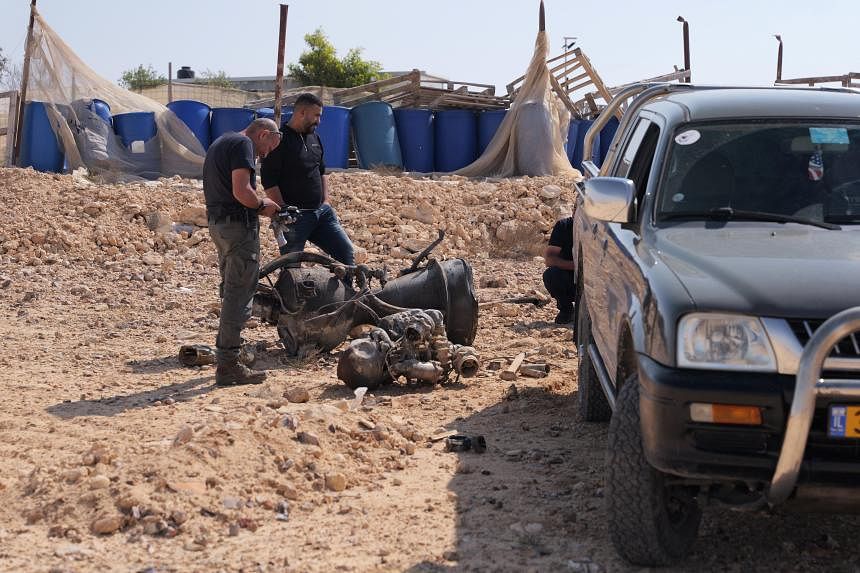JERUSALEM - Israel and Iran traded threats after Tehran’s first ever direct attack on Israel heightened tensions in the Middle East and as the war in the Gaza Strip ground on with no truce in sight.
Israel’s military chief of staff Herzi Halevi said on April 15 Israel would respond to Iran’s weekend missile and drone strikes.
“This launch of so many missiles, cruise missiles, and drones into Israeli territory will be met with a response,” he said at the Nevatim Airbase in southern Israel.
In response, Iran’s President Ebrahim Raisi warned that “the slightest action against Iran’s interests will definitely be met with a severe, extensive and painful response”.
Diplomats on April 16 continued to press Israel to temper any retaliation against Iran.
Israel’s war Cabinet has been weighing how to respond to the large-scale missile and drone assault that Iran launched against Israel on April 13.
Several options – ranging from diplomacy to an imminent strike – were being considered, according to an Israeli official briefed on the Cabinet discussions.
Amid questions and concerns over what actions Israel might take, the European Union’s Foreign Affairs Council were set to meet in Brussels on April 16 to discuss ways to calm the tensions.
Iran’s attack – launched in retaliation for a suspected Israeli air strike on its embassy compound in Damascus on April 1 – has increased fears of open warfare between Israel and Iran and heightened concerns that violence rooted in the Gaza war is spreading further in the region.
US President Joe Biden stressed on April 15 that “the United States is committed to Israel’s security”, but also that he wants to prevent the conflict from spreading.
Mr Biden has told Israeli Prime Minister Benjamin Netanyahu the US will not take part in any Israeli counter-offensive against Iran.
Since the start of the war in Gaza on Oct 7, clashes have erupted between Israel and Iran-aligned groups in Lebanon, Syria, Yemen and Iraq.
Israel said four of its soldiers were wounded hundreds of metres inside Lebanese territory overnight. It appeared to be the first such known incident since the Gaza war erupted, although there have been months of exchanges of fire between Israel and Lebanon’s armed group Hezbollah.
“We’re on the edge of the cliff, and we have to move away from it,” Mr Josep Borrell, the European Union’s foreign affairs chief, told Spanish radio station Onda Cero. “We have to step on the brakes and reverse gear.”
French President Emmanuel Macron, German Chancellor Olaf Scholz and British Foreign Secretary David Cameron made similar appeals. United Nations Secretary-General Antonio Guterres have also issued calls for restraint.
“We don’t want to see a war with Iran. We don’t want to see a regional conflict,” said White House national security spokesman John Kirby, adding that it was up to Israel to decide “whether and how they’ll respond”.
Russia has refrained from criticising its ally Iran in public over the strikes but expressed concern about the risk of escalation and also called for restraint. “Further escalation is in no one’s interests,” Kremlin spokesman Dmitry Peskov said.
Iran mounted its attack after the April 1 killing in Damascus of seven Iranian Revolutionary Guards officers, including two senior commanders. Israel neither confirmed nor denied carrying out the attack.
Iran’s retaliatory attack, involving more than 300 missiles and drones, caused modest damage in Israel and wounded a seven-year-old girl. Most were shot down by Israel’s Iron Dome defence system and with help from the US, Britain, France and Jordan.
In Gaza itself, where more than 33,000 Palestinians have been killed in the Israeli offensive according to Gaza Health Ministry figures, Iran’s action has drawn applause.
Israel began its campaign against Hamas after the Palestinian militant group attacked Israel on Oct 7, killing 1,200 people and taking 253 hostages by Israeli tallies.
G-7 mulls sanctions
In Washington, Mr Biden reiterated US commitment to Israel’s security ahead of a meeting with Iraqi Prime Minister Mohammed Shia al-Sudani.
Mr Sudani, speaking alongside Mr Biden, said their views may be divergent about what is happening in the region but they wanted to stop the conflict from expanding.
British Prime Minister Rishi Sunak said the Group of Seven major democracies were working on a package of coordinated measures against Iran.
“I spoke to my fellow G-7 leaders, we are united in our condemnation of this attack,” Mr Sunak said in Parliament.
Italy, which holds the rotating presidency of the G-7, said it was open to new sanctions against individuals engaged against Israel.
In an interview with Reuters, Italian Foreign Minister Antonio Tajani said new sanctions would need the backing of all the G-7. He suggested any new measures would be focused on individuals rather than whole nations.
“If we need to have more sanctions for people clearly engaged against Israel, supporting for example terrorism, supporting Hamas, it is possible to do it,” Mr Tajani said.
Iran’s attack has caused travel disruption, with at least a dozen airlines cancelling or rerouting flights, and Europe’s aviation regulator reaffirming advice to airlines to use caution in Israeli and Iranian airspace.
Iraqi Airways announced a resumption of flights between Iraq and Iran on April 16.
Israel remained on high alert, but the authorities lifted some emergency measures that had included a ban on some school activities and caps on large gatherings.
Iranian Foreign Minister Hossein Amir-Abdollahian said Tehran had informed the US that the attack on Israel would be limited and for self-defence, and that regional neighbours had been informed of the planned strikes 72 hours in advance.
Iranian Foreign Ministry spokesperson Nasser Kanaani said on April 15, however, that no pre-arranged agreement was made with any country prior to the weekend attack.
Mr Kirby said that Iran did not warn the US in advance of the attack’s timeframe or targets, calling reports that Tehran had done so “categorically false”. REUTERS

